Emergencies on Campus

Where to go in a building evacuation
Learn More
Where to shelter in severe weather
Learn More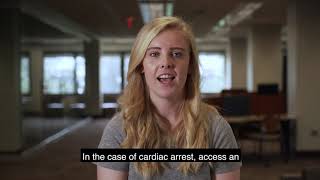
What to do in a medical emergency
Learn More
What to do during an active threat
Learn MorePreparing for Emergencies
In larger emergencies that may impact the entire campus and/or community, first responders may not be able to reach you immediately. As a result, there are several simple steps that you can take to be prepared to handle emergencies on your own. In order to be prepared, you should:
- Know what emergencies can impact you and have a plan for each.
- Always locate two exits in any building that you frequent.
- At a minimum, have an emergency kit in your car and/or residence with a flashlight, whistle, small first aid kit and other items to sustain you for three days.
- Think about how you will communicate with family and friends during an emergency when cell phone systems may be overwhelmed – try texting and/or establishing an out of town emergency phone contact person who family and friends can call to check in and relay messages.
- It may be difficult to remember all the phone numbers that you have entered into your cell phone. Keep a printed list of phone numbers for family, friends and other contacts in case your cell phone is inoperable, the battery is dead or in the event you lose your phone.
- Program emergency contact numbers in your cell phone under your emergency information.
- If you have small children, talk with your schools and day care providers about their emergency procedures.
- Consider taking a CPR/First Aid Class and/or participate in the UGA CERT program.
Emergency Preparedness in 10 Minutes
The UGA Office of Emergency Preparedness (OEP) certainly recognizes this fact and developed a brief online interactive learning module with a campus community sense of preparedness in mind. The module’s intent is to assist in preparing students, faculty, staff, parents, and visitors to be ready for a variety of emergencies that could occur on campus.
Active Shooter – Active Threat
![]() Call 911 immediately.
Call 911 immediately.
- Take the necessary precautions and actions to protect your well-being.
- DO NOT pull the fire alarm to alert others as this may put others in danger.
- AVOID the threat by fleeing the area if safe to do so (RUN).
- DENY access by hiding and barricading if unable to escape – doors locked, lights off, remain silent. Consider texting UGA Police on the UGA Safe app if safe to do so (HIDE).
- DEFEND yourself by fighting back as a last resort (FIGHT).
- Remain in place until authorities advise it is safe.

What to do during an active shooter
Automated External Defibrillator- AEDs
An automated external defibrillator (AED) is a small, portable device that analyzes the heart’s rhythm for any abnormalities and, if necessary, directs the rescuer to deliver an electrical shock to the heart of someone suffering from sudden cardiac arrest. This shock, called defibrillation, may help the heart to reestablish an effective rhythm. AEDs (map of AED locations) can be found throughout the Athens Campus. UGA AED Program / additional information.
Below are a series of videos on how to perform hands-only CPR and how to use one of the two most common AEDs found on the UGA campus.
American Heart Association – Hands-Only CPR
American Heart Association – Hands-Only CPR + AED
How to use a Defibtech Lifeline AED
How to use a Zoll AED
Bomb Threat
Most bomb threats are received by phone. Act quickly, but remain calm and obtain as much information as possible from the caller.
If a bomb threat is received by phone:
- Remain calm. Keep the caller on the line for as long as possible. DO NOT HANG UP, even if the caller does.
- Listen carefully. Be polite and show interest.
- Try to keep the caller talking to learn more information.
- If possible, write a note to a colleague to call the authorities or, as soon as the caller hangs up, immediately notify them yourself.
- If your phone has a display, copy the number and/or letters on the window display.
- Complete the Bomb Threat Checklist immediately. Write down as much detail as you can remember. Try to get exact words.
- Upon termination of call, DO NOT HANG UP, but from a different phone, contact authorities immediately with information and await instructions.
- CALL 911 immediately to give the information you have obtained. Describe the caller’s voice, any background noises you heard, and the exact wording of the message.
- If the bomb threat is received by a handwritten note, call the UGA Police and handle the note as minimally as possible.
- If the bomb threat is received via email or social media, call the UGA Police and do not delete the message.
- Notify your supervisor, a building representative and/or the Dean’s Office at the building where you are located.
- Follow instructions from the Building Safety and Security Representative and the first responders in regards to
evacuation assembly areas.
DO NOT:
- Use two-way radios or cellular phone. Radio signals have the potential to detonate a bomb.
- Touch or move a suspicious package.
Chemical Spill
- Call 911 immediately.
- Do not attempt to clean up the spill.
- Remove yourself and others from the area.
- Cordon off the area and do not let others enter the area.
- If anyone had contact with the hazardous material, they should be isolated and await treatment by emergency personnel.
- Do not pull the fire alarm unless there is a fire.
- Provide first responders with information about the spill, chemical and the spill area.
- Evacuate the building if first responders issue the evacuation order.
- Re-enter the building only when an “all clear” is provided by first responders.
Civil Disturbance / Demonstration
- CALL 911 immediately.
- Notify your supervisor, professor, building representative or dean, as appropriate.
- Remain calm and wait for instructions from the UGA Police.
- Do not attempt to negotiate with the crowd unless directed by the UGA Police.
- Do not attempt to conduct crowd control measures or to intervene unless instructed to by the UGA Police.
- Evacuate the building or other areas as directed by the UGA Police.
The UGA Freedom of Expression policy can be reviewed at freedomofexpression.uga.edu.
Earthquake
- DROP / COVER / HOLD
- Take cover immediately under a desk, chair or table for shelter.
- Seek shelter between seating rows in a lecture hall or against a corridor wall if in a hallway.
- Do not run outside during the shaking or use the stairways or elevators.
- If outside, move to an open area, away from buildings.
- Report injuries and/or building damage to the UGA Police at 911 immediately.
- Be alert for aftershocks, do not use elevators and evacuate carefully.
- Await instructions from first responders and do not re-enter buildings until they are deemed safe for reentry.
Emergency Contacts
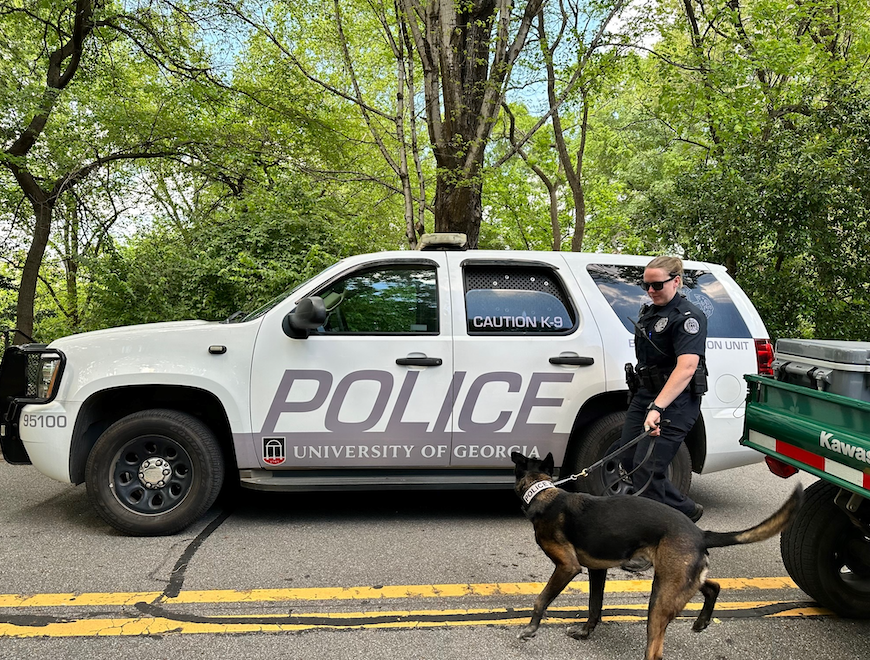 The UGA Police Department is the primary contact for all campus emergencies. The primary emergency number is 911.
The UGA Police Department is the primary contact for all campus emergencies. The primary emergency number is 911.
UGA Police:
- Emergency: 911
- TTY (for Hearing Impaired):(706) 542-1188
- Non-emergency: (706) 542-2200
- Administration/Records: (706) 542-5813
UGA Departments:
- University Health Center: (706) 542-1162
- Biosafety Office: (706) 542-5300
- Student Care & Outreach: (706)542-8479
- Counseling & Psychiatric Services (CAPS) (24/7): (706) 542-2273
- Environmental Safety Division (ESD): (706) 542-5801
- Facilities Management (FMD)
- Work Request Desk:(706) 542-7456
- After hours/holidays:(706) 542-2200
- Office of Emergency Preparedness
(OEP): (706) 542-5845 - Fire Safety (Non-emergency): (706) 542-5801
- Research Safety
(Chemical & Radiation): (706) 542-5288
Athens-Clarke County (ACC):
- Communications Non-emergency: (706) 546-5900
- Police Non-emergency: (706) 613-3345
Hospitals:
- St. Mary’s Hospital: (706) 389-3000
- Piedmont Athens Regional Hospital: (706) 475-7000
Emergency Notification
UGA utilizes several methods to notify the campus community in the event of an emergency that may impact students, faculty, staff, and visitors on campus.
- UGA Alert – Ensure your ability to receive UGA emergency notification messages by verifying your contact
information at www.ugaalert.uga.edu. - UGA Safe App – Download the UGA Safe app and enable push notifications through the app.
- UGA Alert Desktop – Receive UGA emergency messages on computers connected to the UGA network by downloading the app at https://eits.uga.edu/hardware_and_software/software/.
- UGA Emergency website – Save emergency.uga.edu in your browser bookmarks as the official website for emergency event updates.
- UGA Arch News – ([email protected]) Email notification method for crime updates and inclement weather closings.
- Campus Outdoor Warning Sirens – Four campus sirens activated by Athens-Clarke County during tornado warnings for the county.
- UGA Cablevision Emergency Screen Capture – Emergency messages will be displayed on the tv screens on all University controlled tv stations.
During emergency situations, telephone lines will be congested, often impeding critical use by victims and emergency responders. Therefore, when emergency alerts are issued, you are encouraged to refrain from using your office or cell phone except to call for emergency assistance. For large-scale emergencies, updates will be posted on the UGA emergency website. Whenever possible, use email to communicate with relatives to alleviate concerns about your safety.
Emergency Procedures – Disabilities
UGA OEP encourages proactive planning by the entire University community for emergency situations. OEP recommends that any person with a disability who needs assistance alerting and/or evacuating in the event of emergency, self-identify and complete an emergency assistance referral form (EARF). This will assist OEP and other appropriate UGA departments with the development of a personal emergency plan for the individual with a disability.
Evacuating People with Disabilities
- Visually Impaired Persons – Announce the type of emergency, offer your arm for guidance, tell the person where you are going, and ask if further help is needed once you reach safety.
- People with Hearing Limitations – Turn lights on/off to gain the person’s attention, or indicate directions with gestures or write a note with evacuation directions, and assist to safety as needed.
- People Using Crutches, Canes or Walkers – Ask how you can assist them in getting out of the building. They may need someone to walk behind them to prevent others from bumping or jostling them or they may need assistance walking on level ground or down stairs.
- Wheelchair Users – Check with the individual on their preference, determine if an evacuation chair is available, remove any immediate dangers, immediately advise arriving first responders of special evacuation cases. A map of evacuation chairs on the UGA main campus or in the UGA Safe app.
Emergency Response Guidebook
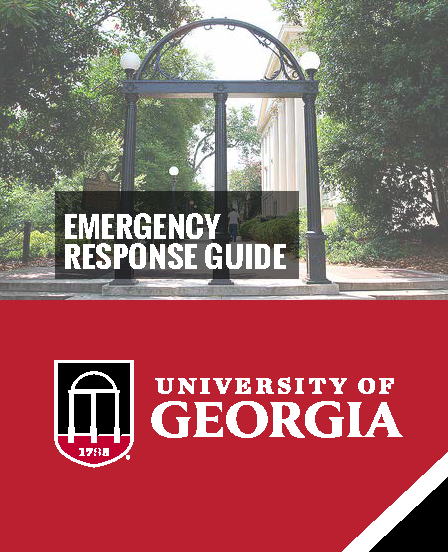 The Emergency Response Guidebook (ERG) for 2024 is now available. It serves as a valuable resource for UGA Faculty and Staff to better prepare them on what action to take during an emergency on campus. It does not replace the UGA Safe app.
The Emergency Response Guidebook (ERG) for 2024 is now available. It serves as a valuable resource for UGA Faculty and Staff to better prepare them on what action to take during an emergency on campus. It does not replace the UGA Safe app.
Remember, being prepared is crucial, whether it’s knowing how to respond during emergencies or what to do after. Stay informed and stay safe!
UGA Departments can order copies of the guides via UGAmart using the Bulldog Print + Design punchout. 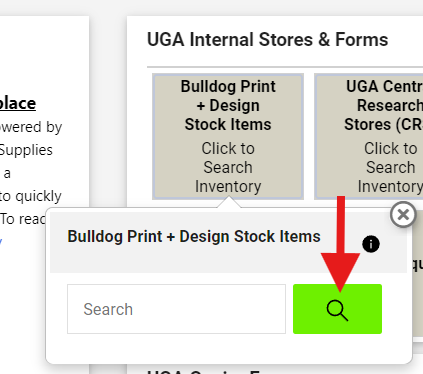
Fire
- Evacuate the building immediately. When the fire alarm is activated, evacuation is mandatory.
- CALL 911 immediately.
- Notify others as you leave.
- Do not use the elevators.
- Always use the stairs to exit upper floors, and if smoke is present, stay low.
- Take your personal belongings (purse, wallet, keys, etc.) as long as these items do not hinder your ability to exit the building quickly.
- Follow directions given by your building’s emergency coordinator, the fire department, or the police.
- Assist individuals who may need assistance to move to a safe area.
- Meet with students and staff at an established outside evacuation location.
- Do not re-enter the building until authorized to do so by emergency personnel.
Contact the UGA Fire Safety Office at (706)542-5801 (non-emergency) for fire prevention tips and for a schedule of upcoming fire extinguisher training classes

Where to go in a building evacuation
Medical Emergency
- CALL 911 immediately.
- Provide the emergency dispatcher with your name, location, number of people injured, and a description of the medical emergency.
- Stay on the phone for instructions of how you can assist.
- Send a responsible person to meet first responders outside of the building on the street to lead the emergency responders back to the injured individual(s).
- Do not move the person unless there is an immediate threat to the injured person in that location.
- Be sure to wear personal protective equipment and avoid body fluids.
- Provide aid to the level of your training.
- UGA has many campus buildings equipped with a number of Automated External Defibrillators (AEDs). Visit the AED map or download the UGA Safe app to find the current locations.
- For life threatening bleeding, Stop the Bleed kits are located in all AED cabinets.
- Some campus buildings are equipped with a naloxone ONEbox for use during a suspected opioid overdose.
- Report the medical injury to your supervisor once the victim receives professional medical attention – see additional instructions under “After the Emergency” tab.
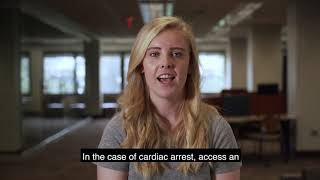
What to do in a medical emergency
Severe Weather
- A tornado watch is issued by the National Weather Service (NWS) when tornadoes are possible in the area.
- A tornado warning is issued by the NWS when a tornado has been sighted, or indicated by weather radar, in the area.
- Monitor TV & radio stations, NOAA weather radio, weather related websites & apps, outdoor warning sirens, etc., for severe weather updates.
- Be prepared to take shelter in the interior hallways or rooms on the lowest level of your building or residence hall if a tornado warning is issued.
- Do not pull the fire alarm to alert others of a tornado warning.
- Stay away from windows and exterior doors.
- Wait for an all-clear notification prior to returning to your work area, classroom, or living area.
- If outdoors, lie in a ditch, low-lying area, or crouch near a building if a shelter is not available or if there is no time to get indoors.
- If in a car with no nearby shelter, buckle your seat belt and stay low.

What to do in Severe Weather
Student/Employee Crisis Response
Students
If you are in contact with a student who appears to be an immediate threat to their own safety or that of others, please call 911.
Non-emergency situations in which the student does not pose an immediate threat to self or others, but exhibits behavior revealing a potential for harm may be referred to:
- Counseling & Psychiatric Services (CAPS) (24/7) at (706) 542-2273
- Student Care and Outreach at (706) 542-8479
- University Police at (706) 542-2200
The Behavioral Assessment Response Council (BARC) is a group of key administrators who assess and determine the
appropriate response to students who exhibit threatening behavior to themselves and/or others. BARC is charged with
balancing the individual needs of the student and the shared needs of the campus community when initiating appropriate intervention for each individual case based on the circumstances provided. Learn more at studentaffairs.uga.edu/barc.
Faculty/Staff
If you are in contact with an employee who appears to be an immediate threat to their own safety or that of others, please call 911.
Non-emergency situations in which the employee does not pose an immediate threat to self or others, but exhibits behavior revealing a potential for harm may be referred to:
- UGA Human Resources (706) 542-2222
- The Acentra Health Employee Assistance Program provides 24/7 access to free counseling specialists for
employees for mental health and emotional support. Sessions can be conducted virtually or in person (mylifeexpert.com or 844-243-4440).
Suspicious Package
- Do not open the suspicious item. If you have opened it, remain calm.
- Call 911 immediately.
- Do not move the letter or package or examine it further.
- Keep others out of the area. Close off the area if possible.
- If possible, limit the use of two-way radios and cell phones near the suspicious item.
- If the package is leaking a substance or powder and you came in contact with the substance, keep your hands away from your eyes, nose, mouth or any part of your face. Do not touch others or let others touch you.
- Wash your hands and arms from the elbow down with soap and hot water.
- Do not attempt to clean or cover anything that might have spilled from a package.
- Make a note of the package appearance including whether it was hidden, any stains or leaks, approximate size and shape, and any addressing or labels. Provide this information to the police.
- Follow all instructions given by the UGA Police.
Utility Failure
Immediately report utility failures during regular business hours to the FMD Work Request Desk at (706) 542-7456 or
to the UGA Police at (706) 542-2200 on weekends and on holidays.
Gas Leaks:
- Evacuate the area immediately.
- Do not attempt to shut off or manipulate valves.
- Activate building emergency notification procedures to ensure everyone in the building is notified.
- CALL 911.
- Do not switch on lights or any other electrical equipment.
- Do not smoke in the area.
- If leak is outside, do not remove any vehicles from the immediate area until cleared by first responders.
- Account for all building personnel once outside and wait for further instructions from first responders.
Power Outage:
- Help co-workers in darkened areas move to safer locations.
- Secure current experimental work and keep refrigerators and freezers closed.
- Unplug personal computers, appliances and non-essential electrical equipment.
- Open windows for additional light and ventilation.
- Check all building elevators for stranded personnel/students. Advise UGA Police of locations of any disabled
elevators with occupants. - Follow the instructions given by the first responders or FMD personnel.
Elevator Failure:
- Report the problem to the UGA Police through the elevator emergency phone or by calling 706-542-2200.
- Do not attempt to exit the elevator or remove passengers if it is stuck between floors.
- In most situations, UGA Police will send an officer and the elevator contractor to assist in restoring service to the
elevator and safely removing passengers.
Winter Storm
After the Emergency
Workplace Injury / Illness
- Call 911 for any injuries that require immediate medical attention.
- Notify the injured person’s immediate supervisor to file appropriate reports.
- Supervisors should document and report injuries occurring on UGA property and/or in
the course of employment.
Building Damages
- Notify the UGA Police at (706) 542-2200.
- Take the necessary steps to protect property from further damage.
- Report all claims upon discovery of the incident to the Insurance and Claims Management Office within 48 hours. ([email protected] or (706) 425-3083)
